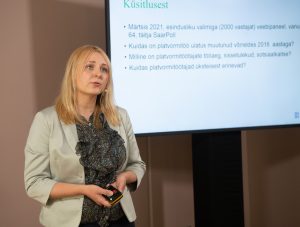Estonian residents underestimate the risk of needing long-term care according to the Foresight Centre report The Need for Long-Term Care in Estonia. One in two of the now 65-year-old Estonian residents will need long-term care services in the future.
News
Estonia has the lowest asset taxes in the European Union, the brief report “Asset Taxes in Estonia and in European countries” by the Foresight Centre reveals. If asset taxes amounted to the average level of the European Union, over 500 million euro would be received additionally in the state budget.
The corporate income tax in Estonia is the highest in the Baltics but among the lowest in the European Union, shows the Foresight Centre brief report “Corporate tax in Estonia and European Countries”. The future taxation of businesses is likely to be impacted by the collective attempts of countries to eliminate tax gaps.
The tax burden in Estonia is one of the lowest in the European Union and according to the data of 2019, it reaches 33.3% of gross domestic product, the brief report of the Foresight Centre of the Riigikogu (Parliament of Estonia) “Tax Trends in Estonia and in the European Union” shows. Estonia is also one of the three member states of the European Union with the least tax incentives and derogations. In the future, rapid changes in society will reduce the possibility to finance public spending from labour taxes in the current extent.
The taxes on alcohol and tobacco in Estonia are among the greatest in the European Union, the brief report of the Foresight Centre of the Riigikogu (Parliament of Estonia) shows. Alcohol and tobacco excise duties form 4.8% of the tax revenue in the state budget of Estonia.
At present, the public sector of Estonia spends more than 100 million euro per year on long-term care, but during the next 50 years, the annual need for providing long-term care services may increase to nearly 900 million euro (if expenses are calculated on the basis of today’s level of prices and wealth), the OECD predicts. Estonia’s possibilities were discussed at the Foresight Centre web seminar “Long-term care: where to find the money for it?”, held on 3 June.
The Foresight Centre study “Platform Work in Estonia in 2021” shows that the government lacks a detailed overview of platform workers and the extent of the tax gap relating to it. If the share of platform work grows even more in the future, an increasing part of such workers will remain without social protection.
Encouraging the people working through digital platforms to use business account could annually bring up to 68 million euros in tax revenues into the state budget, shows the Foresight Centre study “Platform Work in Estonia in 2021”, which was published on 2 June.
The incomes of the people who work through digital platforms are lower than the Estonian average, shows the Foresight Centre study “Platform Work in Estonia in 2021”, which was published on Wednesday, 2 June.
Nearly 56,000 people work through digital platforms every week in Estonia, shows the Foresight Centre study “Platform Work in Estonia in 2021”, which was published on Wednesday, 2 June. During the last year, more than 160,000 people have done platform work at least once.

 An independent think tank at the Riigikogu
An independent think tank at the Riigikogu 




 Johanna Vallistu
Former Expert of Foresight Centre
Johanna Vallistu
Former Expert of Foresight Centre